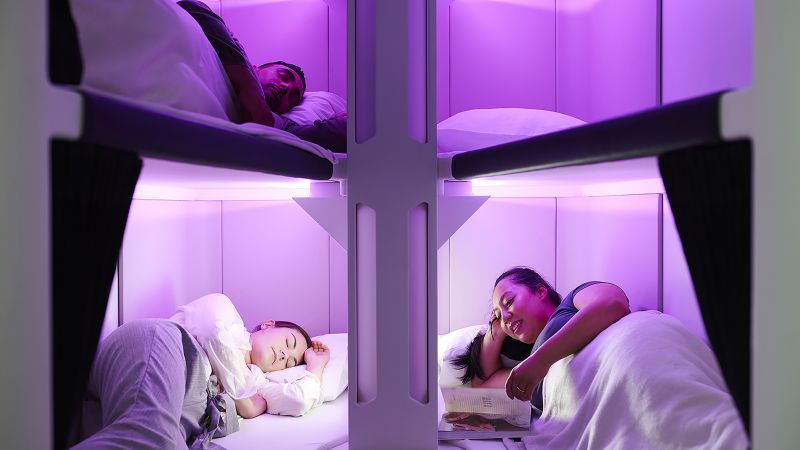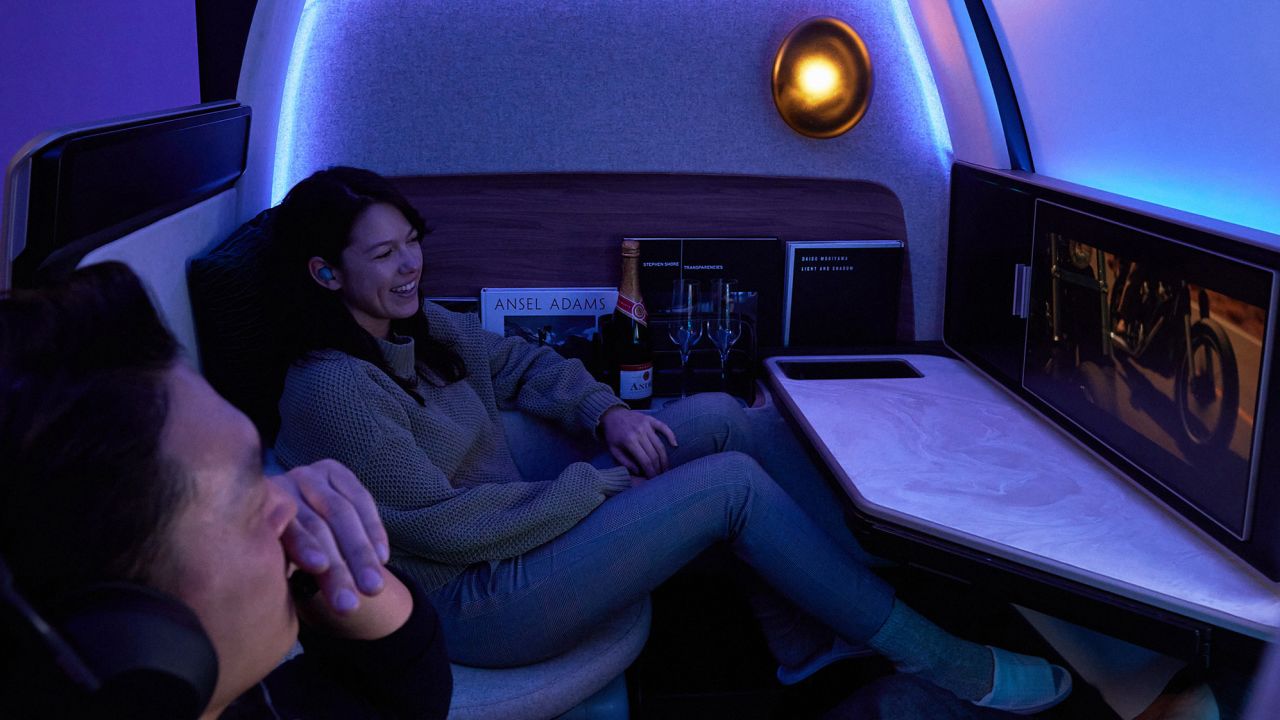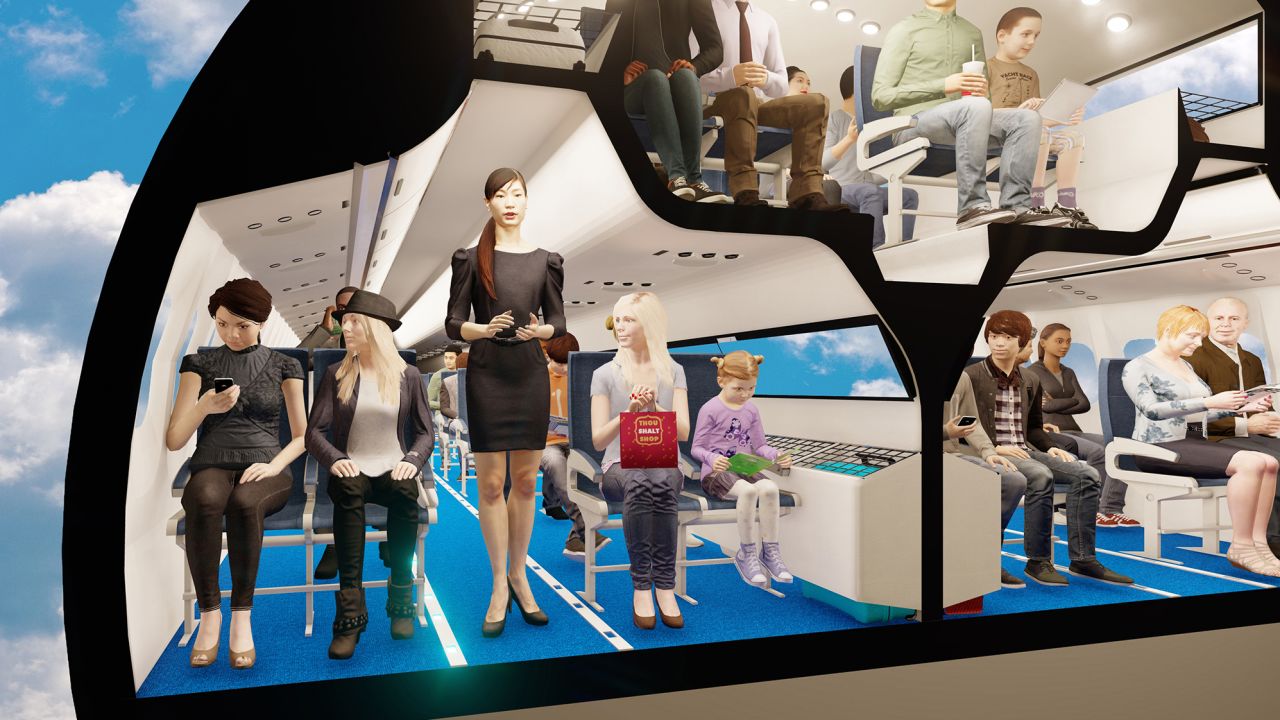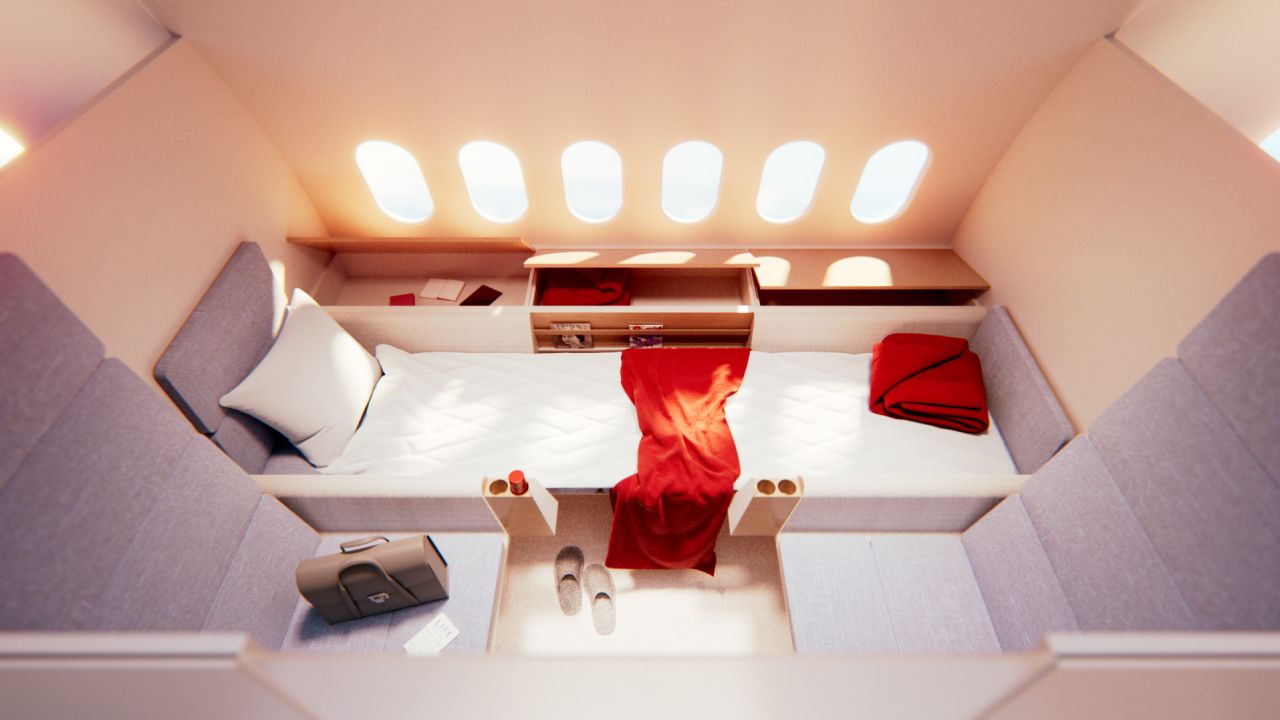
Editor’s Note: Sign up for Unlocking the World, CNN Travel’s weekly newsletter. Get the latest news in aviation, food and drink, where to stay and other travel developments.
CNN
—
From a cabin concept that completely eradicates the middle seat to a swanky design that takes single-aisle aircraft business class to a new level, this year’s Crystal Cabin Awards shortlist offers an exciting glimpse at aviation’s potential future.
Every year the Crystal Cabin Awards showcase innovative ideas that reconceptualize the airplane cabin experience. There are eight categories, with awards spotlighting everything from eco-friendly innovations – such as an AI-based food waste app idea from German airline Lufthansa – to next generation concepts straight from the university classroom.
Julia Grosser, a spokesperson for the Crystal Cabin Award Association, says this year’s shortlist suggests aviation is turning a corner after the uncertainty of the peak pandemic years.
“Airlines, manufacturers, and suppliers are heavily investing in their onboard products again,” Grosser tells CNN Travel, pointing to the “significant innovation visible even in economy class – from bunk beds to better connectivity.”
Among the shortlisted cabin innovations is Air New Zealand’s “Skynest” concept, which envisages bookable sleeping pods made up of six lie-flat bunk beds, designed to give economy long-haul passengers the opportunity to get some proper shuteye.
“Being a small country at the bottom of the world, long-haul travel is vital to keeping us connected and allowing tourists to visit our beautiful country,” Kerry Reeves, Air New Zealand’s head of aircraft programs, tells CNN Travel.
The motivation behind SkyNest is Air New Zealand’s belief that passengers should be able to “get a good rest, no matter the cabin,” as Reeves puts it.
The pods are arranged like bunk beds, made up of two rows, each containing three beds, bookable for approximately four hours.
Air New Zealand has been working on SkyNest for several years, with the concept first revealed back in 2020. Work’s now firmly underway to make the project a reality – Reeves says the airline is currently “working through the in-depth certification and engineering detail of having the Skynest on our new 787 aircraft.”
Air New Zealand has also built several prototypes. It’s currently considering whether it can transport one to the 2023 Airline Interiors Expo in Hamburg, Germany – an aviation symposium where the Crystal Cabin Award Association is set to announce its 2023 winners.

Other shortlisted concepts include Adient Aerospace’s “Front-Row Business Class Retreat,” designed by the aerospace company in cooperation with Boeing EnCore Interiors.
Stephanie Faulk, Adient’s director of sales and marketing, says the inspiration for the concept, which has been in the works since early 2022, was “the design challenge of bringing a wide-body experience to a narrow-body cabin.”
“As the capabilities of narrow-body airplanes grow, they are taking on long-haul missions – flying increasingly further,” says Faulk. “The result is an inherent desire for increased comfort and features equivalent to wide-body airplanes.”
While business class on wide-body airliners can be a very swanky experience, on narrower aircraft it usually just means a bit more leg room and some upscale food and drink.
Adient and Boeing Encore Interiors set about imagining an elevated short-haul business class: a lie-flat bed, loads of storage for luggage, minibar, library and space for another passenger to join you for a meeting or catch-up.
Faulk says the concept’s already “received a lot of interest and positive feedback” from airlines.

While Adient’s design works with the restrictions of pre-existing cabin configurations, the “Multicabin” concept from Spanish architecture company Taller De Arquitectura T36 seeks to completely overhaul the airplane cabin.
Taller De Arquitectura T36 imagines three separate economy cabins on two levels. The aim, according to the designers, is to say “goodbye to middle seats.” The design includes a mix of real and virtual windows.
The design would also up the number of seats in the cabin – always appealing to airlines, even if the emergency exit situation is less obvious.
Another shortlisted entry, Euphony, is a new airplane seat concept from French aircraft interior designer Safran Seats, produced in collaboration with audio technology company Devialet, that aims to improve inflight entertainment.
Euphony does away with the need for a personal headset. Instead, speakers are installed in each individual seat’s headrest, with sound levels perfected so passengers can enjoy their choice of inflight entertainment without being overheard or disturbed by their neighbor.
CNN Travel tested out the concept at last year’s Aircraft Interiors Expo, concluding: “Euphony is no replacement for the cocoon-like experience of noise-canceling headphones, but it’s a comfortable set up and feels more akin to the experience of watching a movie on your couch.”

The Crystal Cabin Award’s “University” category offers a glimpse into the minds of the next generation of aviation designers.
Take the Tilde Aviation Concept by Joshua Nilsson, a Scottish graduate of the Savannah College of Art and Design.
Originally Nilsson’s university senior thesis, it imagines a private, enclosed in-air suite, ideal for passengers traveling in a group.
The suite’s configuration can transform from four chairs sitting opposite each other to lie-flat beds.
Nilsson tells CNN Travel he was inspired by fond memories of family vacations.
“From economy to first class, the experiences are designed to be solitary and for me, travel is anything but,” he says. “I wanted to put connection at the heart of my design which is why I made an aviation suite perfected for group travel.”
Nilsson recently moved back to Scotland, where he’s founded his own design studio. He says he hopes the attention of the Crystal Cabin Awards could allow him to make the concept a reality.
The Crystal Cabin Awards finalists are set to be announced in May, while the winners will be announced in June.
